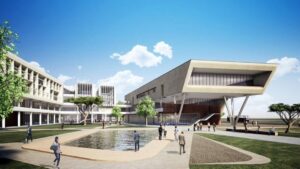
University Education and Research Principal Secretary Amb. Simon Nabukwesi has announced that the Kenya Advanced Institute of Science and Technology (KAIST) will open doors to its first cohort of students in June this year.
The University has been designed after the Korean Advanced Institute of Science and Technology, the initial science and Technology University in Korea which promotes technical training for economic growth. Kenya is looking forward to using the university to build robust technology experts, who will engineer the country’s digital transformation and economic growth.
Speaking in this year’s Kenya Secondary Schools Heads Conference that is taking place in Mombasa, the former high school principal drew parallels and comparisons from South Korea.
“In 1994, South Korea’s economy was lower than Kenya’s,” he said.
“But the moment they established the Korean Advanced Institute of Science and Technology, almost everything changed because the University put them at the technological front, and they industrialised very fast.”
Konza University of Technology will also admit students to pursue Masters and PhD degrees.
Nabukwesi said that the country should borrow good learning practices that are done in countries such as Canada, Cuba and Finland.
The countries, among other things, have fully implemented practical learning, which equip learners with practical and technical knowledge. For instance, Finland and Canada have collaborative learning, where experts in various fields go to school to teach some lessons and interact with learners, to encourage and guide them.
Kenya is also trying to emulate the practice, however, slowly. In 2016, the ministry of education introduced the competence based curriculum, an education model that focuses on practical learning of a learner, rather than theoretical learning using the 8-4-4 learning system.
The PS encouraged the principals to motivate students to study careers that they love.
“Most people in Kenya today are doing what they don’t like, and it is a thing we should discourage. Encourage the learners to study for a career that they love,” he said.
In addition, the former ambassador to Canada also motivated Kenyans to study French, saying the language proficiency opens many doors to international jobs.
“Rwanda beats us in taking up international jobs because they are good in English and French. We too can export labour to the world. There are many jobs in the Diaspora and other world bodies that Kenyans can do well,” he said
Ambassador Nabukwesi asked Kenyans interested in Diaspora jobs to visit the department of Diaspora Affairs in the ministry of Foreign Affairs to get help.
The Permanent Secretary, in his speech, recalled his old days at university and the National Youth Service (NYS) that students used to go through before joining campus.
“NYS instilled orderliness, patience and obedience. I wish it could be modified and re-introduced. It will help the young people to be a little bit harder because they are now very fragile.”
Construction of KAIST is being done on a 36-acre piece of land in the Konza Techno City located in Machakos County. The technology-oriented campus will comprise 10 research science labs working with specialized local and international researchers in science, technology and engineering.
KAIST is anticipated to boost Science, Technology, Engineering and Mathematics (STEM) courses in institutions of higher learning in a bid to build human capacity to industrialize the economy by 2030 as well as drive economic growth through advanced science and technology.
Last week, the Cabinet Secretary for ICT, Joe Mucheru unveiled the Kenya National Digital Master plan for the period 2022-2032 during the annual Connected summit at Diani, Kwale County.
The master plan proposes the acceleration of the development of Konza Technopolis to promote cloud services and data management.



